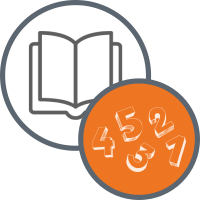You are here
Mathematics Support for ESSER K-8 Mathematics Curricula Grant Program
Curriculum Support Menu
Mathematics Support ESSER K-8 Mathematics Curricula Grant Program
The ESSER K-8 Mathematics Curricula and K-3 READ Act Instructional Programming Grant exists to provide grants to local education providers (LEPs) to support the purchase of high-quality, standards-aligned K-8 mathematics curricula and K-3 READ Act-approved instructional programs. With an application deadline of April 29, 2022, applicants have a limited timeline for selecting the materials they intend to support with grant funds. The two most likely timelines for adoption and implementation are:
Full Adoption in 2022-2023
- Use March and April of 2022 to choose materials
- Purchase materials in June of 2022 after the award announcement
- Get curriculum-based professional development in July and/or August 2022, and as needed through the school year
- Expect full implementation in the 2022-2023 school year
Risks to consider: This approach requires a quick commitment. This approach will most likely be appropriate for districts that are further along in their thinking and preparation to adopt materials.
Phased Adoption in 2022-2023
- Use March and April of 2022 to choose a shortlist of materials (perhaps only one) to pilot
- Purchase pilot materials in June of 2022 after the award announcement
- Get curriculum-based professional development in July and/or August 2022, and as needed through the school year
- Pilot materials in Fall (and perhaps Spring) of 2022-2023
- Commit to materials and scale up the purchase of materials before the award period ends on June 30, 2023
Risks to consider: Grant funds may only be used for pilot materials that are ultimately adopted, and districts risk not coming to a consensus before funds have to be used. This approach will most likely be appropriate for districts less further along in their thinking and preparation to adopt materials, and/or those required by local policy to have longer pilots.
CDE Support for an Expedited, 8-Week Adoption Process
Week 1 (Wednesday, March 2, 3:30-4:30): Making the Most of Math Materials
- Perspectives and research results about the role of materials in mathematics learning
- Features to look for that are worth your time and effort
- Focus on long-term achievement & making teaching doable
- This event is part of the SIS Setting the Standard Webinar Series.
Week 2 (Thursday, March 10, 3:30-4:45): Contacting Publishers and Refining Criteria
- Proposed plan: Have Zoom breakouts with reps from each publisher to meet & greet and answer questions
- Refine criteria and get frontrunners down to 3-4 choices
Week 3 (Thursday, March 17, 3:30-4:45): Building Stakeholder Support
- Get teachers on board
- Open the process to students, parents, board members, community
- Come together around common goals
- This event is the March CoMath Conversation
Week 4 (Thu 3/24 3:30): Cancelled
Week 5 (Thu 3/31 3:30): Office Hours and Updated Grant Allowable Expenses
- NEW: Awards under this grant can be used retroactively to cover allowable expenses incurred since March 13, 2020
- Time for questions and discussion about the grant program
Week 6 (Thu 4/7 3:30): Digging Deep Into the Mathematics
- Focus on the quality of the tasks and coherence across the curriculum
- Don’t get distracted by the shiny stuff
- Connecting teaching and student practices to the materials at a lesson level
- Register here.
Week 7 (Thu 4/14 3:30): CoMath Curriculum Cohorts: Learning Fast to Implement Well
- “CoMath Curriculum Cohorts” as Networked Improvement Communities
- Practical measures to help learn and adapt
- Gain from the experience and expertise of others to learn what works under what conditions
- This event is the April CoMath Conversation. Register here.
Week 8 (Thu 4/21 3:30): Forming Consensus and Application Q&A
- Clear and concise communication with teachers, families, and your board
- Addressing concerns, dispelling rumors, easing fears
- Questions and answers about your grant application
- Register here.
The Importance of Curriculum-Based Professional Development
Recent studies show that fewer than half of teachers have gotten multi-day professional development focused on their curriculum materials, and only 6% of teachers report having gotten such PD more than a few times (Polikoff, et al., 2020). Although there is a wealth of wonderful PD in mathematics that isn't focused on any one set of materials, it can be very efficient and powerful for teachers to receive curriculum-based professional development. In their publication, The Elements: Transforming Teaching Through Curriculum-Based Professional Learning, authors Jim Short and Stephanie Hirsh of the Carnegie Corporation of New York describe it as:
Curriculum-based professional learning invites teachers to participate in the same sort of rich, inquiry-based learning that new academic standards require. Such learning places the focus squarely on curriculum. It is rooted in ongoing, active experiences that prompt teachers to change their instructional practices, expand their content knowledge, and challenge their beliefs. This stands in contrast to traditional teacher training, which typically relays a static mass of information that teachers selectively apply to existing practice.
In The Elements, the authors describe six fundamental shifts from traditional teacher professional development to curriculum-based professional learning:
- A shift from being focused on topics or themes to being focused on instructional materials with specific teaching strategies.
- A shift from one-time workshops, usually when school is closed to repeated sessions, coaching, and feedback opportunities during teachers' regular workdays.
- A shift from teachers grouped by school to teachers grouped by the curriculum they are using.
- A shift from information shared in lectures, presentations, or Q&A discussions to active learning experiences, such as practicing instruction or participating in lessons as students.
- A shift from coaching and feedback reserved mostly for new or struggling teachers to curriculum-focused coaching and feedback for all teachers.
- A shift from selected teachers receiving support for using new curriculum materials to all teachers using new materials participating in curriculum-based professional learning.



Connect With Us





